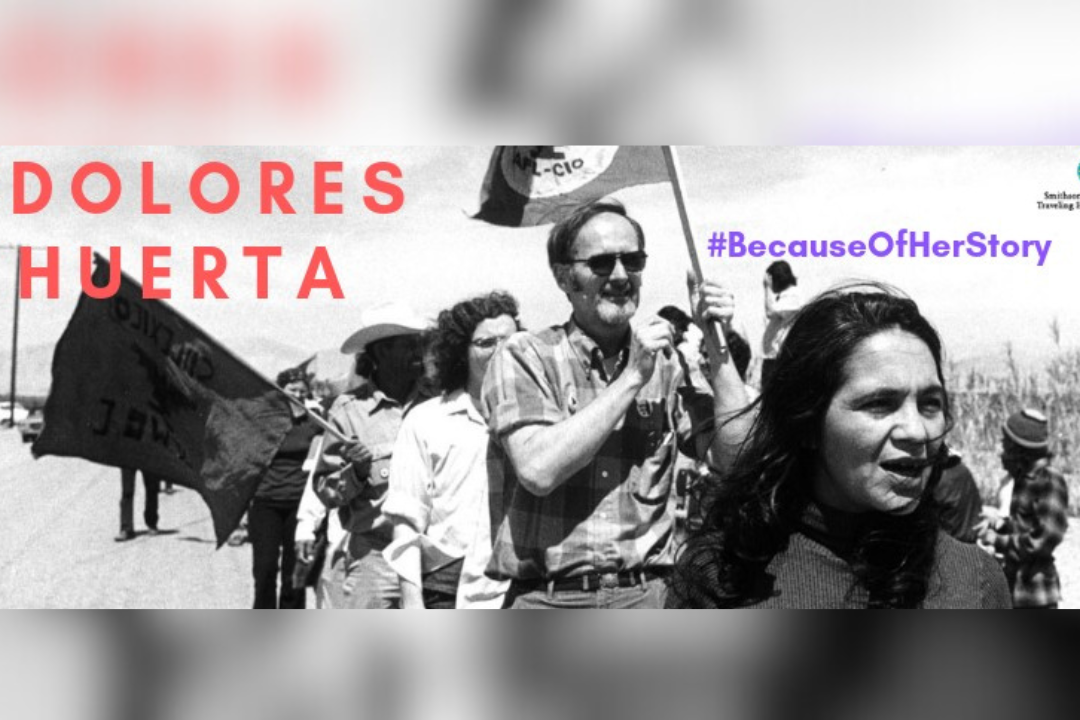“Dolores Huerta: Revolution in the Fields/Revolución en los Campos” opens September 14 at the Greeley History Museum. The traveling Smithsonian exhibition shares Huerta’s story and her work as an activist in the farm workers’ movement.
This bilingual (Spanish and English) exhibition was curated by The Smithsonian Institution Traveling Exhibition Service (SITES) and has traveled all over the country. Weld County, with its own long history of farm worker activism, is its final stop.
The exhibition features a collection of photographs and a free smartphone app that includes interviews with Huerta and a short bilingual documentary video. Visitors will learn about Huerta’s early influences and her time as a female voice in the often male-dominated farm workers’ movement. The exhibition also includes information about Huerta’s fellow organizers Larry Itliong and César Chávez, and artistic contributors like Xavier Viramontes and El Teatro Campesino.
Before the movement, the California grape laborers faced discrimination, below-poverty wages, and unsafe working and living conditions. Huerta and her colleagues challenged the system and galvanized solidarity. Her name and impact are often overlooked. Her coined phrase “Yes, we can! / ¡Si, se puede!” is often attributed to other historical figures. When most women were still expected to play domestic roles, Huerta introduced new models of womanhood. She was an energetic picket captain, persuasive lobbyist, and unyielding negotiator.
While learning about Huerta and her legacy, visitors to the exhibition will also learn about Weld County’s own history of activism. From the 1920s to the 1960s, Latino farm laborers in the county faced poor working and living conditions along with racism and disenfranchisement. This led many to seek change by the early 1970s. Following the examples of Dolores Huerta, César Chávez and the African American civil rights movement, Chicano/a activists from across Weld County took part in demonstrations, marches, walk-outs and sit-ins, calling for social and economic justice for migrant and settled farm workers. Despite successes, their struggle continues.
Organized by SITES in collaboration with the Smithsonian’s National Portrait Gallery, the exhibition received federal support from the Latino Initiatives Pool, administered by the Smithsonian Latino Center. For more than 65 years, SITES has been sharing the wealth of Smithsonian collections and research programs with millions of people outside Washington, D.C.
The Greeley History Museum (GreeleyMuseums.com), 714 8th Street, is open Thursdays through Saturdays, 10 a.m.- 4 p.m.
Museum at Twilight Forum and Opening Reception
To celebrate the opening of the Dolores Huerta Revolution in the Fields/Revolución en los Campos exhibition, the Greeley History Museum will host a Museum at Twilight Forum on September 16 at Hensel Phelps Theatre from 4-6 p.m. Learn about Huerta and the farm workers’ movement and explore the local story connected to the movement. Hear from special guests including a virtual presentation from María del Carmen Cossu, project director for Latino initiatives for the Smithsonian Institution Traveling Exhibition Services. Tickets are $8 – $3 per person available at http://ucstars.showare.com/Huerta
Following the Museum at Twilight forum there will be a free opening reception at the Greeley History Museum from 6-8 p.m. to view the exhibition.

